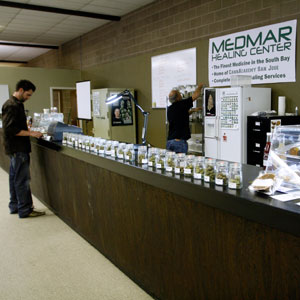Last Friday, Amy Genovese was at her desk in the offices of the San Jose Patients Group, a medical marijuana dispensary on The Alameda, when more than a dozen law enforcement officers, some wearing masks, appeared outside.
“They had their guns drawn, and they pointed them at my receptionist,” Genovese says. “They told her to put up her hands and to open the door—but she had to press a buzzer under her desk to open the door, and she was afraid to move. They were shouting at her and she was terrified.”
Once the confusion settled, officers entered the building and ripped the dispensaries’ security cameras from the walls, according to Genovese’s husband, SJPG owner Dave Genovese. Over the course of the next four hours, the agents confiscated virtually everything in the building, including patient files, computers, personal cell phones, $30,000 in cash and $170,000 worth of what Genovese assiduously refers to as “medicine.”
The operation was one of a number of “smash and grab” raids on local pot dispensaries that occurred last Thursday and Friday, Nov. 3 and 4, just days after San Jose voters overwhelmingly approved Measure U, a medical marijuana tax.
Dave Genovese says he—and everyone else in the medical marijuana community—knew that local cops were on the warpath following the explosion of local pot dispensaries. He says he can understand and even support such a campaign, if the goal is to crack down on unlawful operators. And he concedes that the local landscape has become littered with shady suppliers, which he says range from “lemonade stands that have no idea what they’re doing” to “backdoor operations” essentially dealing dope behind the imprimatur of helping patients.
Genovese says his dispensary is one of a few dozen that are carefully following guidelines issued by the attorney general’s office in 2008. He is also a founding member of a coalition called MC3, which has been working with San Jose city officials for months in an effort to craft an ordinance regulating the distribution of medical cannabis. He says he was therefore stunned to find himself being “hammered” by an investigator from the DA’s office, Dean Ackeman.
“They made us put our hands behind our heads and stand against a wall,” Genovese says. “[Ackeman] kept saying, ‘Admit you’re a for-profit.’ But we’re not, and we can prove it.”
Ackeman did not return phone calls for comment.
Genovese is in fact registered as a “mutual benefit” not-for-profit California corporation. He says he has shown the city his books to prove that he is above-board, and is confident that the DA will find nothing illegal.
“I can guarantee you that every red cent has been accounted for, and every single crumb of product has been accounted for,” he says.In the wake of the raid, Genovese’s business and personal bank accounts have been frozen. He vows that he will sue the county to get his property back.
Boom and Bust
The raids were conducted by the Santa Clara County Special Enforcement Team (SCCSET), a multi-agency task force, headed by the Santa Clara Police Department, which includes representatives from the district attorney’s office and the cities of San Jose, Gilroy, Campbell, Mountain View, Milpitas and Los Gatos. The
{pagebreak}
task force has been carrying search warrants issued by Superior Court Judge Phillip Pennypacker.
The timing of last week’s raids, two and three days after 79 percent of San Jose voters approved Measure U, has City Councilman Pierluigi Oliverio, the measure’s author, somewhat concerned.“If they’re targeting dispensaries that are not operating under Prop. 215 and [Assembly Bill] 420, that’s fine. If they’re targeting facilities adjacent to schools or parks, that’s fine. But not if these dispensaries are operating in appropriate locations and within the law.”Oliverio points out that the SCCSET task force appears to be receiving funding from a grant that was specifically earmarked for the suppression of methamphetamines.
In April, District Attorney Dolores Carr applied for a $470,238 grant from the California Emergency Management Agency (CalEMA). It specifies that SCCSET receive funding due to the “high incidence of methamphetamine cases countywide.”
“Emphasis should continue to be placed on methamphetamine suppression, as well as drug-related violence suppression,” the grant reads.
Oliverio says those crimes should be prioritized. ”If the task force has been given x amount of money for methamphetamines and guns, then maybe they should go after methamphetamines and guns. I think there are more serious crimes being committed in San Jose than medical marijuana being supplied to patients.”
In the wake of the Patient Group raid, the 12 medical marijuana dispensaries that make up MC3 have for the most part suspended their operations. “They are refusing to open until the city puts some rules on the books for them to follow,” Genovese says, adding that they can’t afford to have all of their money, medicine and equipment confiscated. He believes the goal is for the pot clubs to become “victims of attrition.”Hector Amador, co-owner of MedMar Healing Center, a medical cannabis collective on Autumn Street, is keeping his doors open. But he is worried that the task force might pay him a visit, despite what he says are rigorous efforts to adhere to the law.
Like Genovese, Amador seems to have read the 2008 AG’s guidelines carefully enough to have them memorized. He and business partner Doug Chloupek say they also took pains to comply with guidelines drafted by the city in 1997, the year after the Compassionate Use Act was passed by state voters. And like Genovese, Amador and Chloupek understand that something needs to be done about the unregulated proliferation of pot clubs.
“I honestly don’t have a problem with it,” Amador says. The problem, he says, is that the city of San Jose has not acted in a timely manner to create an ordinance to regulate dispensaries. “It’s the city’s responsibility,” Amador says. “When you see a problem, you address the problem. So to a point they are to blame.”
The fact that the Patients Group was hit seems to lead Amador and Chloupek to fear that this operation is an effort by law enforcement to indiscriminately shut down all of the valley’s medical marijuana dispensaries. “Following the election, we thought we were headed in the right direction,” he says. “When I heard that Measure U had passed by such a big margin, in a sense that told me the residents of San Jose had said, ‘They’re OK, as long as we can tax them,’ that we can co-exist.And then we hear about these raids.”
Amador and Chloupek say they’ve heard rumors that these raids are just the beginning. “If that’s the case,” Amador says, “it’s really scary.”

 Girls Night Out
Girls Night Out 
